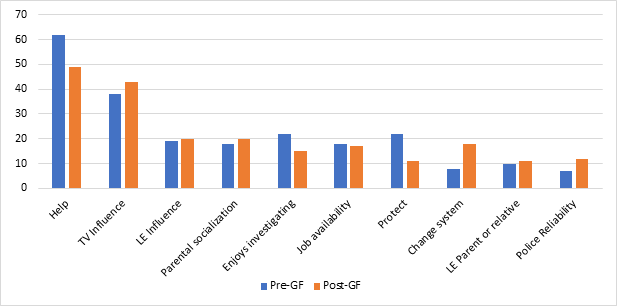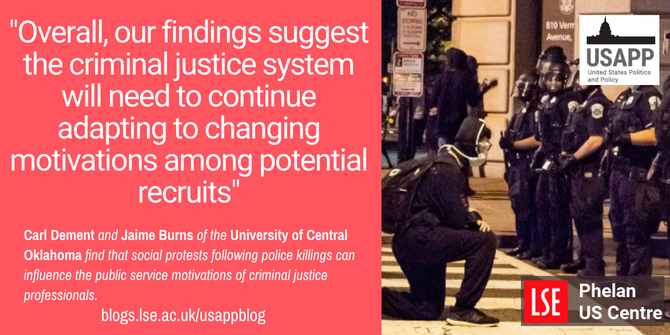
 In recent years, social protests surrounding the death of George Floyd have highlighted the need for a strong sense of Public Service Motivation (PSM) within those entering the criminal justice field to serve their communities more effectively. In the wake of these protests, Carl Dement and Jaime Burns conducted a longitudinal study of criminal justice student essays written between 2017 and 2022 to compare the PSM of criminal justice students before and after the murder of George Floyd by police, finding significant differences between pre- and post-George Floyd groups. Their results have important implications for the recruitment and retention of criminal justice professionals, as well as the organizational culture of criminal justice agencies.
In recent years, social protests surrounding the death of George Floyd have highlighted the need for a strong sense of Public Service Motivation (PSM) within those entering the criminal justice field to serve their communities more effectively. In the wake of these protests, Carl Dement and Jaime Burns conducted a longitudinal study of criminal justice student essays written between 2017 and 2022 to compare the PSM of criminal justice students before and after the murder of George Floyd by police, finding significant differences between pre- and post-George Floyd groups. Their results have important implications for the recruitment and retention of criminal justice professionals, as well as the organizational culture of criminal justice agencies.
The killing of George Floyd in May 2020 by a Minneapolis police officer sparked a wave of protests across the United States and beyond. The incident brought to the forefront issues of racial injustice, police brutality, and social inequality while highlighting the importance of public service and the role of criminal justice professionals in promoting social change. To examine the effects of this changing context, we conducted a longitudinal study among criminal justice students to better understand the changes in Public Service Motivation (PSM) among students before and after George Floyd’s murder by police.
The study draws on the PSM typology developed by Indiana University’s James L. Perry and Lois Recascino Wise, which identified three distinct motivations for public service: rational, norm-based, and affective. The rational typology includes participation in the process of policy formulation, commitment to a public program because of personal identification, and advocacy for a special or private interest. The norm-based typology is characterized by a desire to serve the public interest, loyalty to duty and to the government, and a commitment to social equity. The affective typology is based on a genuine conviction about the social importance of a program and a sense of benevolent patriotism.
Analyzing criminal justice students’ motivations for public service
We used a qualitative document analysis approach to examine the motivations of declared criminal justice majors in a southern university. These students were at the freshman/sophomore level of their undergraduate studies, and on graduation, the students could enter any one of the three main parts of the justice system, police, courts, or corrections.
Our study was conducted by collecting 227 essays from students, who described their reasons for selecting criminal justice as their major. The essays were written between Fall 2017 and Spring 2022 and were separated into two groups: 114 essays written before the George Floyd incident, and 113 essays written after. We used qualitative analysis software to code, systematize, and classify the essays, and the analysis revealed a total of 27 individual PSM codes. Figure 1 shows the top ten codes.
Figure 1 – Top 10 Public Service Motivation codes in criminal justice students’ essays before and after the killing of George Floyd by police

The effects of George Floyd’s murder by police on public service motivation
Quantitative analysis of the results showed statistically significant differences in PSM between the pre- and post-George Floyd groups on only two factors. The post-George Floyd group showed a greater desire to “change the system” than the pre-George Floyd group. Moreover, TV and media had a bigger influence on the post-George Floyd group. We think this may be because this group was exposed to more media-driven public service values and role models during the post-George Floyd years and may reflect broader societal changes, such as increased awareness of social justice issues and a growing desire for systemic reform.

Photo by Gayatri Malhotra on Unsplash
Both groups also ranked helping others as their number one motivation. There are several possible reasons why there was no statistically significant difference between the pre- and post-George Floyd groups on the ‘Help’ PSM. One could be that the value of helping others is deeply ingrained in our society and culture and is therefore not strongly influenced by specific events or trends. Yet, another reason could be that the ‘Help’ PSM is a fundamental aspect of the criminal justice profession, and therefore remains a top priority for those who choose to pursue this career path, regardless of external factors.
We applied Perry and Wise’s typology (mentioned above) to sort the essays into the three PSM types: rational, normative, and affective. The rational typology remained the most prevalent, representing 39 percent of the essays, while the norm-based and affective typologies represented 34 percent and 27 percent, respectively. Our finding that the rational typology remained the most prevalent among criminal justice students suggests students are motivated by a desire to be effective and efficient in helping others while adhering to policy guidelines. This may be reflective of a broader trend in the criminal justice system towards a more bureaucratic approach, with an emphasis on policies, procedures, and quantitative measures of success.
The fact that the norm-based and affective typologies were a smaller proportion of the essays suggests students may be less motivated by a sense of duty or moral obligation towards serving the public interest, or by an emotional connection to the work of criminal justice professionals. This could have important implications for the recruitment and retention of criminal justice professionals, as organizations may need to find new ways to appeal to a smaller cohort of recruits attracted to these types of motivations to secure and retain employees.
Implications of changing motivations for recruiting criminal justice professionals
Our findings have important implications for recruiting and retaining criminal justice professionals with strong PSM. Those organizations seeking quality recruits and elevated retention will need to consider the changing motivations of this younger demographic. A better understanding of these motivations will allow organizations to more effectively communicate their values, norms, and expectations to attract candidates who share their goals and principles.
Providing opportunities for autonomy and decision-making authority will be important for retention, as this allows employees a chance to feel more invested in their work and to take ownership of their decisions. By offering opportunities for PSM enhancement, better retention of younger members could be boosted.
Using PSM as a basis for advancement could incentivize employees to develop a deeper commitment to public service values and strive for excellence in their work in several ways. When employees are recognized and rewarded for demonstrating PSM, it reinforces the importance of public service values and motivates employees to incorporate these values into their work. This can lead to a sense of personal fulfillment and accomplishment, which further motivates employees to strive for performance excellence. Additionally, if PSM is used as a basis for advancement, it may create a greater culture of public service within the organization, which can attract and retain employees who share these values. Employees who feel their organization is committed to public service values are more likely to be engaged in their work, which can lead to higher job satisfaction and better performance.
Overall, our findings suggest the criminal justice system will need to continue adapting to changing motivations among potential recruits and foster an environment that supports and enhances PSM among employees. By doing so, criminal justice organizations can attract and retain professionals who are committed to public service and to working towards a more just and equitable society.
- Please read our comments policy before commenting.
- Note: This article gives the views of the author, and not the position of USAPP – American Politics and Policy, nor the London School of Economics.
- Shortened URL for this post: https://bit.ly/3CmZlRK






